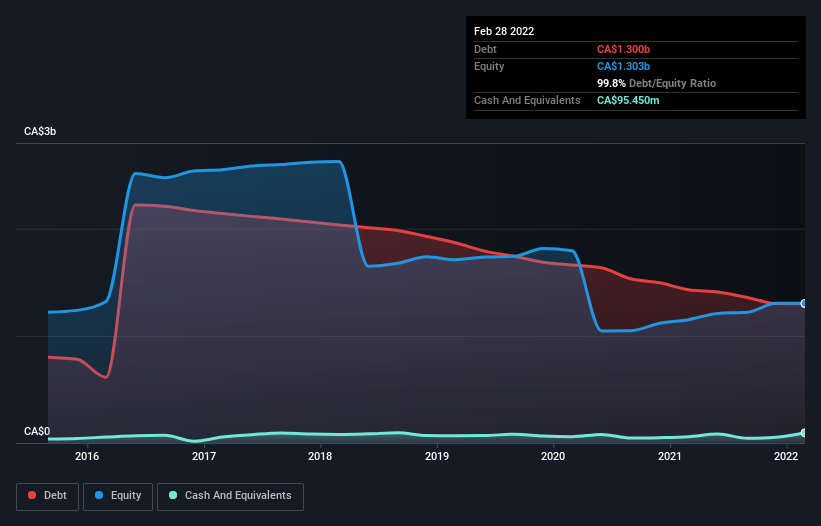These 4 Measures Indicate That Corus Entertainment (TSE:CJR.B) Is Using Debt Extensively
Warren Buffett famously said, 'Volatility is far from synonymous with risk.' It's only natural to consider a company's balance sheet when you examine how risky it is, since debt is often involved when a business collapses. As with many other companies Corus Entertainment Inc. (TSE:CJR.B) makes use of debt. But should shareholders be worried about its use of debt?
When Is Debt A Problem?
Debt and other liabilities become risky for a business when it cannot easily fulfill those obligations, either with free cash flow or by raising capital at an attractive price. In the worst case scenario, a company can go bankrupt if it cannot pay its creditors. However, a more frequent (but still costly) occurrence is where a company must issue shares at bargain-basement prices, permanently diluting shareholders, just to shore up its balance sheet. Of course, the upside of debt is that it often represents cheap capital, especially when it replaces dilution in a company with the ability to reinvest at high rates of return. When we examine debt levels, we first consider both cash and debt levels, together.
View our latest analysis for Corus Entertainment
What Is Corus Entertainment's Net Debt?
As you can see below, Corus Entertainment had CA$1.30b of debt at February 2022, down from CA$1.43b a year prior. On the flip side, it has CA$95.5m in cash leading to net debt of about CA$1.20b.

How Healthy Is Corus Entertainment's Balance Sheet?
Zooming in on the latest balance sheet data, we can see that Corus Entertainment had liabilities of CA$603.8m due within 12 months and liabilities of CA$2.14b due beyond that. On the other hand, it had cash of CA$95.5m and CA$388.5m worth of receivables due within a year. So its liabilities outweigh the sum of its cash and (near-term) receivables by CA$2.26b.
The deficiency here weighs heavily on the CA$825.0m company itself, as if a child were struggling under the weight of an enormous back-pack full of books, his sports gear, and a trumpet. So we'd watch its balance sheet closely, without a doubt. After all, Corus Entertainment would likely require a major re-capitalisation if it had to pay its creditors today.
We measure a company's debt load relative to its earnings power by looking at its net debt divided by its earnings before interest, tax, depreciation, and amortization (EBITDA) and by calculating how easily its earnings before interest and tax (EBIT) cover its interest expense (interest cover). Thus we consider debt relative to earnings both with and without depreciation and amortization expenses.
Corus Entertainment's net debt is sitting at a very reasonable 2.5 times its EBITDA, while its EBIT covered its interest expense just 3.3 times last year. While these numbers do not alarm us, it's worth noting that the cost of the company's debt is having a real impact. Importantly Corus Entertainment's EBIT was essentially flat over the last twelve months. We would prefer to see some earnings growth, because that always helps diminish debt. There's no doubt that we learn most about debt from the balance sheet. But ultimately the future profitability of the business will decide if Corus Entertainment can strengthen its balance sheet over time. So if you're focused on the future you can check out this free report showing analyst profit forecasts.
Finally, while the tax-man may adore accounting profits, lenders only accept cold hard cash. So the logical step is to look at the proportion of that EBIT that is matched by actual free cash flow. During the last three years, Corus Entertainment produced sturdy free cash flow equating to 74% of its EBIT, about what we'd expect. This free cash flow puts the company in a good position to pay down debt, when appropriate.
Our View
We'd go so far as to say Corus Entertainment's level of total liabilities was disappointing. But on the bright side, its conversion of EBIT to free cash flow is a good sign, and makes us more optimistic. Once we consider all the factors above, together, it seems to us that Corus Entertainment's debt is making it a bit risky. Some people like that sort of risk, but we're mindful of the potential pitfalls, so we'd probably prefer it carry less debt. There's no doubt that we learn most about debt from the balance sheet. But ultimately, every company can contain risks that exist outside of the balance sheet. To that end, you should learn about the 3 warning signs we've spotted with Corus Entertainment (including 1 which is a bit unpleasant) .
At the end of the day, it's often better to focus on companies that are free from net debt. You can access our special list of such companies (all with a track record of profit growth). It's free.
New: AI Stock Screener & Alerts
Our new AI Stock Screener scans the market every day to uncover opportunities.
• Dividend Powerhouses (3%+ Yield)
• Undervalued Small Caps with Insider Buying
• High growth Tech and AI Companies
Or build your own from over 50 metrics.
Have feedback on this article? Concerned about the content? Get in touch with us directly. Alternatively, email editorial-team (at) simplywallst.com.
This article by Simply Wall St is general in nature. We provide commentary based on historical data and analyst forecasts only using an unbiased methodology and our articles are not intended to be financial advice. It does not constitute a recommendation to buy or sell any stock, and does not take account of your objectives, or your financial situation. We aim to bring you long-term focused analysis driven by fundamental data. Note that our analysis may not factor in the latest price-sensitive company announcements or qualitative material. Simply Wall St has no position in any stocks mentioned.
About TSX:CJR.B
Corus Entertainment
A media and content company, operates specialty and conventional television networks, and radio stations in Canada and internationally.
Undervalued with slight risk.
Similar Companies
Market Insights
Community Narratives



